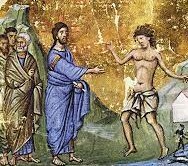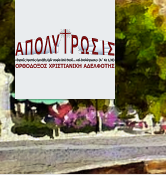Translation from the book:
Στεργίου Ν. Σάκκου, Ἑρμηνεία στό κατά Λουκᾶν Εὐαγγέλιο, τόμ. Α΄,
ἐκδ. «ΧΡΙΣΤΙΑΝΙΚΗ ΕΛΠΙΣ» ΟΡΘΟΔΟΞΗ ΑΔΕΛΦΟΤΗΤΑ, Θεσ/νίκη 2008, σσ. 191-196
(Stergios N. Sakkos [Read CV], A Commentary on the Gospel according to St. Luke, vol. A', pp. 191-196)
After his visit to Nazareth Jesus went to Capernaum. This city was an important trading center. In addition to the many residents, people from all over the province came there daily for various jobs. Capernaum thus provided suitable conditions for the preaching of the gospel to spread over a wide area. The evangelist Matthew describes it as his "own city" (9:1), because the Lord settled there and made it his base (cf. Mt 4:13. 23). During the three years of his preaching ministry, he was mainly confined to the region of Galilee, based in Capernaum, while he went to Judea only on the great feasts (see Jn 2:13; 5:1; 7:10; 10:22-23; 12:12), when many other Galileans went up there.
4,31-32. Καὶ κατῆλθεν εἰς Καπερναοὺμ πόλιν τῆς Γαλιλαίας, καὶ ἦν διδάσκων αὐτοὺς ἐν τοῖς σάββασι· καὶ ἐξεπλήσσοντο ἐπὶ τῇ διδαχῇ αὐτοῦ, ὅτι ἐν ἐξουσίᾳ ἦν ὁ λόγος αὐτοῦ.
4:31-32 And he went down to Capernaum, a city of Galilee. And he was teaching them on the sabbath days; and they were astonished at his teaching, for his word was with authority.
Luke uses the phrase “went down” for the passage from the one city to the other, for Nazareth was built on the mountain (see v. 29), while Capernaum was built at a lower elevation, by the lake of Gennesaret, on the borders of the tribes of Zabulon and Nephthalim (see Mt 4:13). Addressing the Gentile Christians, who did not know the geography of the region, he also gives the information that Capernaum was also a “city of Galilee”.
Jesus in the beginning was teaching in the synagogues “on the Sabbath days”, keeping the relevant commandment of the Decalogue; "Remember the Sabbath day, sanctify it" (Ex 20:8). Later, of course, he did not speak only in synagogues or only on the Sabbath day; he took advantage of every opportunity in every place, always causing the surprise and admiration of his audience for the power and authority of his sayings (see comments on 4:15).
4,33. Καὶ ἐν τῇ συναγωγῇ ἦν ἄνθρωπος ἔχων πνεῦμα δαιμονίου ἀκαθάρτου.
4:33 And in the synagogue there was a man who had the spirit of an unclean demon.
The word "spirit" in the Holy Bible has many meanings. It means the air, the soul, the mind, evil spirits, angels, the Holy Spirit, God. In this particular verse it is made clear that it refers to the “spirit of an unclean demon”. Demons are unclean spirits who rejoice in vile deeds and pollute the minds of men with evil thoughts. They have lost their first purity since they sided with Lucifer and opposed the works of the holy God. They completely dominate the human being whom they conquer by abolishing his personality and his will. They speak with his mouth. They act and manifest their power with his limbs, even performing miracles, such as oracles or cures. The possessed under the influence of demons behave like madmen, they are wild and dangerous.
In the days of Jesus' public ministry there were many demon-possessed people in Palestine. The Son of God came into the world "he might destroy the works of the devil" (1 Jn 3:8), and Satan used his powers to prevent him. Especially after his humiliation in the wilderness, he seemed that he had gathered all his troops in order to overcome his invincible opponent. The final frontal conflict, of course, took place on the cross.
4,34. καὶ ἀνέκραξε φωνῇ μεγάλῃ λέγων. ῎Εα, τί ἡμῖν καὶ σοί, Ἰησοῦ Ναζαρηνέ; Ἦλθες ἀπολέσαι ἡμᾶς; Οἶδά σε τίς εἶ, ὁ ἅγιος τοῦ Θεοῦ.
4:34 and he cried out with a loud voice. “Ah! What have you to do with us, Jesus of Nazareth? Have you come to destroy us? I know who you are, the Holy One of God.”
It may cause some concern that a man with an unclean spirit was present in the synagogue. Probably he had entered without being noticed or perhaps he had no demonic manifestations for a long period of time, giving the impression that he was healthy. Jesus’ presence, however, disturbed the demon and under its influence, the possessed man “cried out with a loud voice”, burst into loud cries.
The word “ἔα” (imperative of the verb "ἐάω-ῶ", which means "to leave") was used as an exclamation of surprise or displeasure, like the one we use “a!” or “ah!” Here denotes the displeasure of the demon. He was disturbed by the presence of Jesus, he was afraid and cried out. The expression “what have you to do with us” is stereotypical (cf. Judg 11:12; 2 Sam 16:10; 1 Kings 17:18; 2 Kings 3:13; Mt 8:29; Jn 2:4). Its meaning is determined by the relationship, affinity or difference that exists between the persons involved. In this case the demon with terror asked, "Is there any problem between us, Joshua Nazarene? We do not hurt you, we do not bother you. Why do you bother us? Have you come to destroy us?" Although the demon knew that Jesus was not born in Nazareth, he called him “Nazarene”, wanting to mislead the people who were waiting for the Messiah from Bethlehem. As noted elsewhere (Mt 8:29; Mk 5:7; Lk 8:28), the demons considered it a disaster not only to be destroyed but also to be removed from the possessed man. Because they would be no longer able to harm him and would be deprived of their greatest satisfaction. For the exact Messianic title, the Son of God, by which the demon addressed Jesus, see the comments on the corresponding "Son of God" of verse 4:3.
4,35. Καὶ ἐπετίμησεν αὐτῷ ὁ Ἰησοῦς λέγων· φιμώθητι καὶ ἔξελθε ἐξ αὐτοῦ. Καὶ ῥῖψαν αὐτὸν τὸ δαιμόνιον εἰς τὸ μέσον ἐξῆλθεν ἀπ᾿ αὐτοῦ, μηδὲν βλάψαν αὐτόν.
4:35 But Jesus rebuked him, saying, “Be silent, and come out of him!” And when the demon had thrown him down in the midst, he came out of him, without doing him any harm.
 Jesus rebuked the demon, and commanded it to be silent and depart. He did not accept his revelation. Luke writes below that the Lord, as the absolute master of his work and plan, would not allow the demons to "advertise" Him; and would not allow them to speak" (v. 41). The same tactics were subsequently followed by the apostles. They did not accept the slightest service from the demons (see Acts 16:16-18).
Jesus rebuked the demon, and commanded it to be silent and depart. He did not accept his revelation. Luke writes below that the Lord, as the absolute master of his work and plan, would not allow the demons to "advertise" Him; and would not allow them to speak" (v. 41). The same tactics were subsequently followed by the apostles. They did not accept the slightest service from the demons (see Acts 16:16-18).
The evangelist emphasizes that the demon left, without harming the man at all. This, indeed, had made a very vivid impression on those present, for they had expected to see the possessed man dead or even wounded. The evangelist Mark, who also described the incident, noted that the demon "threw down the man and made him roll" (1:26) and came out of him. The Lord let the demon's wickedness show, but did not allow it to harm the man in the least, thus revealing his power and mercy.
4,36-37. Καὶ ἐγένετο θάμβος ἐπὶ πάντας, καὶ συνελάλουν πρὸς ἀλλήλους λέγοντες· τίς ὁ λόγος οὗτος, ὅτι ἐν ἐξουσίᾳ καὶ δυνάμει ἐπιτάσσει τοῖς ἀκαθάρτοις πνεύμασι, καὶ ἐξέρχονται; Καὶ ἐξεπορεύετο ἦχος περὶ αὐτοῦ εἰς πάντα τόπον τῆς περιχώρου.
4:36-37 And they were all amazed and said to one another, “What is this word? For with authority and power he commands the unclean spirits, and they come out.” And the fame of him went out into every place of the country round about.
The people were astonished and talked among themselves about the miraculous authority and power Jesus’ word; he commanded the unclean spirits and they immediately obeyed and departed!
After the demon-possessed man was healed, the fame of Jesus spread like lightning; “And the fame of him went out”. His word that had driven away the demon echoed like a resounding echo “into every place of the country round about”, in every town and village of Galilee.
Copyright © 2021 by Orthodox Christian Association «ΧΡΙΣΤΙΑΝΙΚΗ ΕΛΠΙΣ» ΟΡΘΟΔΟΞΗ ΑΔΕΛΦΟΤΗΤΑ. Used by permission. All rights reserved.









